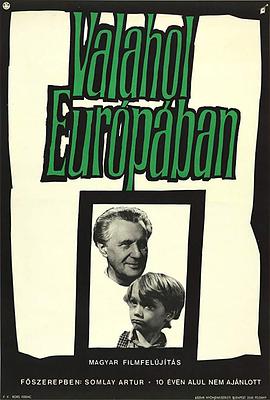欧洲的某个地方8.0
又名:ouzhoudemougedifang
扫一扫手机看
简介
Somewhere in the remote region, the war ends. In the midst of ruined cities and houses in the streets, in rural hamlets, everywhere where people still live, are children who have lost their homes and parents. Abandoned, hungry, and in rags, defenseless and humiliated, they wander through the world. Hunger drives them. Little streams of orphans merge into a river which rushes forward and submerges everything in its path. The children do not know any feeling; they know only the world of their enemies. They fight, steal, struggle for a mouthful of food, and violence is merely a means to get it. A gang led by Cahoun finds a refuge in an abandoned castle and encounters an old composer who has voluntarily retired into solitude from a world of hatred, treason, and crime. How can they find a common ground, how can they become mutual friends? The castle becomes their hiding place but possibly it will also be their first home which they may organize and must defend. But even for this, the price will be very high.
To this simple story, the journalist, writer, poet, scriptwriter, movie director, and film theoretician Béla Balázs applied many years of experience. He and the director Géza Radványi created a work which opened a new postwar chapter in Hungarian film. Surprisingly, this film has not lost any of its impact over the years, especially on a profound philosophical level. That is to say, it is not merely a movie about war; it is not important in what location and in what period of time it takes place. It is a story outside of time about the joyless fate of children who pay dearly for the cruel war games of adults.
At the time it was premiered, the movie was enthusiastically received by the critics. The main roles were taken by streetwise boys of a children's group who created their roles improvisationally in close contact with a few professional actors, and in the children's acting their own fresh experience of war's turmoil appears to be reflected. At the same time, their performance fits admirably into the mosaic of a very complex movie language. Balázs's influence revealed itself, above all, in the introductory sequences: an air raid on an amusement park, seen in a montage of dramatic situations evoking the last spasms of war, where, undoubtedly, we discern the influence of classical Soviet cinematography. Shooting, the boy's escape, the locomotive's wheels, the shadows of soldiers with submachine guns, the sound of a whistle—the images are linked together in abrupt sequences in which varying shots and expressive sharp sounds are emphasized. A perfectly planned screenplay avoided all elements of sentimentality, time-worn stereotypes of wronged children, romanticism and cheap simplification. The authors succeeded in bridging the perilous dramatic abyss of the metamorphosis of a children's community. Their telling of the story (the scene of pillaging, the assault on the castle, etc) independently introduced some neorealist elements which, at that time, were being propagated in Italy by De Sica, Rossellini, and other film artists. The rebukes of contemporary critics, who called attention to "formalism for its own sake" have been forgotten. The masterly art of cameraman Barnabás Hegyi gives vitality to the poetic images. His angle shots of the children, his composition of scenes in the castle interior, are a living document of the times, and underline the atmosphere and the characters of the protagonists. The success of the picture was also enhanced by the musical art of composer Dénes Buday who, in tense situations, inserted the theme of the Marseilaise into the movie's structure, as a motive of community unification, as an expression of friendship and the possibility of understanding.
Valahol Europaban is the first significant postwar Hungarian film. It originated in a relaxed atmosphere, replete with joy and euphoria, and it includes these elements in order to demonstrate the strength of humanism, tolerance, and friendship. It represents a general condemnation of war anywhere in the world, in any form.
猜你喜欢
-
HD
达达达达达利!
主演:阿娜伊斯·德穆斯蒂埃,埃德瓦·贝耶,乔纳森·科恩,吉尔·勒卢什,皮奥·马麦,狄迪尔·弗拉蒙,罗曼·杜里斯,艾格妮丝·赫斯泰尔,让-马利·文灵,玛丽·布奈尔,Catherine Schaub-Abkarian,马克·弗赖兹,杰罗姆·尼尔,鲍里斯·吉洛,维克托·阿西,约翰·迪翁内,Hervé Pauchon,Angélique Pleau,Matthias Girbig,Éric Naggar -
HD粤语
海鸥来过的房间
主演:黄柏豪,林上,陈斐力,莫倩婷,杨彬 -
HD
冷漠怪
主演:Maya de Vicq,Eduarda Samara,Erom Cordeiro,Ian Boechat,Kaique Brito,Alaylson Emanuel,Lucas Da Silva,Elany Santos,Maeve Jinkings -
HD
如果我能冬眠
主演:Taivanbat Alexandar,Batmandakh Batchuluun,Tuguldur Batsaikhan ,Berkhel,Sukhee Lodonchuluun,Ganchimeg Sandagdorj,达瓦·桑巴沙拉,Batzorig Sukhbaatar,Nominjiguur Tsend,巴特楚吉·乌尔萨伊赫 -
更新HD
犯罪都市4
主演:马东锡,金武烈,李东辉,朴智焕 -
HD
冰下的鱼
主演:高放,周波,庄馨,王莉,崔璐,张弘海,朱艳彬,周洪儒 -
更新HD
野马国语
主演:居内什·森索伊,多嘉·泽伊内普·多古斯鲁,涂格巴·桑古罗格鲁,艾丽特·伊斯坎,伊利亚达·阿克迪肯,Nihal G. Koldas,艾贝尔克·佩克詹,Bahar Kerimoglu,布拉克·伊依特,Erol Afsin,Suzanne Marrot,Serife Kara,Aynur Komecoglu,Sevval Aydin,Enes Sürüm -
HD中字
虽然只是弄丢了手机
主演:北川景子,千叶雄大,田中圭,成田凌,笨蛋节奏,要润,高桥玛莉润,笕美和子,原田泰造,樱井由纪,松山爱里,北村匠海 -
HD
逃逸追踪
主演:白恩,曲尼次仁 -
HD
彩虹线
主演:丁榆,杜丰宇 -
HD中字
我是你的女人
主演:瑞秋·布罗斯纳安 玛莎·斯蒂芬妮·布莱克 阿琳泽·科纳 弗兰 -
更新HD
朝云暮雨
主演:范伟,周冬雨,宋佳,毛孩,范湉湉,杨皓宇,邓飞

